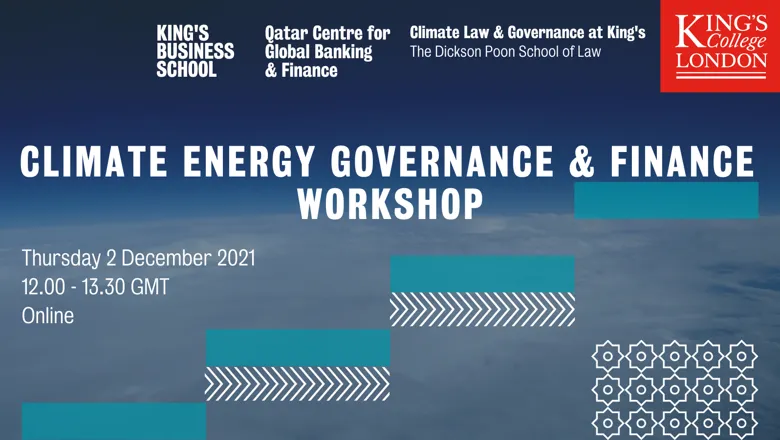
Climate Energy Governance & Finance workshop
This workshop aims to facilitate interdisciplinary discussions and collaborations on issues at the intersection of financial and...
13 December 2021
Dr Timothy Foreman provides a summary of the first Climate Energy Governance & Finance workshop, organised jointly by the Qatar Centre for Global Banking & Finance and the Climate Law and Governance Centre at King's. The workshop aimed to promote interdisciplinary discussions and collaborations on climate risks and energy transitions from a financial and regulatory perspective.

The workshop began with Mark Manning of the UK Financial Conduct Authority (FCA). His presentation focused on the role of ESG transparency and trust in financial markets. He began by outlining the current state of regulation in the ESG space, which so far has been behind the pace of financial firms marketing claims of ESG performance. This leaves ample space for the possibility of greenwashing, both by individual firms and financial products that package together with the claims of these firms. His presentation noted that research has tied better performance on ESG metrics to higher firm value. However, the precise mechanism through which this happens is still a matter of debate, with the possibility that firms that are better at communicating their ESG performance are better managed and better at other aspects of their business.
His presentation noted several avenues for research to support the development of government policy and regulators' aims. One promising direction is to identify environmental impacts at the level of individual products. This is the level that can be communicated to consumers of these products and to investors, who would then be able to compare the performance of firms producing similar products. In this way, firms would not be able to manipulate their emissions intensity by, for example, merging with other firms that may produce products in a less emissions-intensive industry. He also emphasised the need to produce international standards for regulations under the umbrella of a body such as IOSCO. He noted the progress that has been made as part of the COP26 in Glasgow, including the introduction of the Glasgow Financial Alliance for Net Zero (GFANZ) and the formation of the International Sustainability Standards Board (ISSB) as part of the IFRS Foundation. The ISSB will define sustainability disclosure standards that will allow regulators worldwide to have a template of best practices for designing regulation. As part of this effort, the board will start with disclosures related to climate change but will seek guidance on the next areas of sustainability that should be addressed next.
The presentation by Dr Robyn Klingler-Vidra and Dr Adam Chalmers highlighted their research in the area of sustainability disclosure and corporate sustainability policy more broadly. This project seeks to understand how policies relating to corporate sustainability move from one place to another, what determines how well they are adopted and put into practice, and the ultimate effects. They develop measures of different aspects of the text of regulations published by various bodies, from international organizations to more local authorities, including the complexity of the text itself. Their preliminary results indicate that the simpler a text is, the more likely it is to diffuse to other localities, indicating that bodies wishing to spread their ideas, such as the ISSB noted above, should strive to keep their language simple to foster wider adoption around the world. Their early results also indicate that corporate social policy adoption has its largest effect on the "social" component of ESG, in contrast with previous, more limited studies of the topic.
Dr Megan Bowman also spoke about some of the progress made at COP26 and the governance mechanisms that will be needed to implement the ambitious carbon emissions reduction targets that world leaders have embraced. In particular, she highlighted the commitment from the Paris agreement of "making finance flows consistent with a pathway towards low greenhouse gas emissions and climate-resilient development." She divided the space of options into "financial mechanisms" and "facilitative modalities." The set of financial mechanisms includes taxes on carbon emissions or lending to fossil fuel-burning companies, mandates on the portfolios of regulated banks, and other direct interventions in markets. Facilitative modalities, meanwhile, encompasses the more indirect forms of intervention, such as the definition of disclosure rules that firms have to follow, the provision of information about firms and country-level objectives, and the development of taxonomies of firms or industries. This is to facilitate understanding among market participants about which firms or sectors are the most polluting or most ambitious in achieving net-zero targets and which may be at risk of facing more direct governmental intervention in the future.
Overall, the presentations highlighted the many issues facing governments in their journey, from the targets that have been established to concrete achievements on the ground. They established a number of areas that are currently fertile ground for research and presented a number of open questions. One common theme throughout was the need to get firms to act in response to changes in government policy. This may fail for a number of reasons, including lack of clarity in government standards, lack of information on how the policies will affect the firms, or the weakness of incentives to induce firms to act, whether these incentives take the form of positive motivation, such as tax advantages or subsidies, or financial burdens in the form of taxes or penalties for non-compliance with government directives. While all of the speakers clearly are grappling with these questions and working to help provide workable solutions, it is clear there is more to be done to ensure a successful transition to net-zero.

This workshop aims to facilitate interdisciplinary discussions and collaborations on issues at the intersection of financial and...